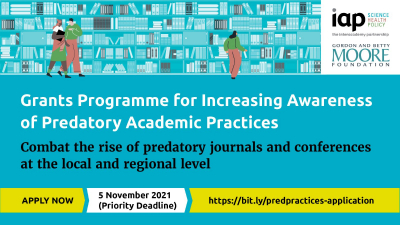


Calls for Proposals to the Grants Programme on Increasing Awareness of Predatory Academic Practices now closed.
IAP is presently conducting a unique study on predatory academic journals and conferences, which will report in early 2022. A vital part of this study is raising awareness of these pervasive and damaging practices amongst the global research community and helping researchers in any country, at any career stage, and in any discipline make informed decisions on where they publish and/or present their work.
The grants programme will support outreach and dissemination efforts that are tailored to local/regional context and designed to raise awareness of predatory academic practices and how to spot them. IAP study outputs – including the results of a global survey of researchers – will be available to support these efforts. Please note you must be affiliated with or a member of an IAP regional network, senior academy, young academy, and/or the Global Young Academy to be eligible to apply. Any one regional network, academy, or academician can only feature in one proposal. Innovative ways of working that engage a diverse community of academicians and researchers will be especially welcome.
Small grants of up to US$10,000 are available for the most competitive and innovative proposals. Priority will be given to applications received by November 5th. Applications received after this date will be considered on a rolling basis. If a larger amount is necessary to implement the initiative, please reach out to the IAP Secretariat to discuss your proposal further. Please see guidance on overhead costs and eligible costs here.
Successful proposals will be announced by the end of November and initiatives must be completed within four months from then, i.e. by end March 2022 latest. A short written report will also be required (a reporting framework will be provided).
Please reach out to the IAP Secretariat (secretariat@iapartnership.org) with any questions. This call is separate from the IAP competitive grants call, on which you can receive more information by reaching out to iap@twas.org.
Application Review Criteria
The criteria against which proposals will be reviewed are as follows:
1. Scope – To support senior and young academies, academicians, GYA members and/or IAP’s Regional Networks, to raise awareness of predatory academic practices in their local, national or regional context and drawing, in part, on materials provided by the IAP study. Those applications that seek to engage other actors, e.g. wider research communities and higher education institutions, research funders/ministries, libraries services, local publishers, will be reviewed favourably.
2. Results – A clearly defined (set of) output(s) and outcome(s) from the initiative is important, with a well-articulated evaluation/impact assessment framework. Applicants are encouraged to be experimental and seek new and innovative ways of raising awareness of predatory academic practices in intelligible, accessible and inclusive ways.
3. Structure and value for money – A well-articulated initiative plan and budget. Please be clear about milestones and deliverables throughout (ideally one for each month of implementation of the grant).
What are predatory academic practices?
Predatory academic practices within IAP’s study encompass predatory journals and conferences. The study highlights that predatory academic practices are difficult to define and the telling signs of these practices exist within a spectrum ranging from fraudulent to low quality to unethical practices.
Predatory practices exploit the need for researchers to publish or increase exposure of their work, particularly those early on in their career. Traits for predatory journals could include a lack of quality peer review processes, posing as reputable journals based on title, and constant spamming of invitations to submit an article, potentially outside of the expertise of that individual. Predatory conferences may also behave in similar ways; however, with the rise of virtual platforms, these conferences can be hard to identify. Some traits that are distinctive to conferences may include high fees, promise of a conference but cancelling prior to it, and encouragement to speak at an event that is outside of their expertise.
These practices can potentially affect important areas of both academia and society by infiltrating the evidence used in public policy, compromising researchers’ reputations and career paths, and potentially wasting billions of dollars in research costs.
Guidance on outreach and dissemination activities
IAP’s two-year study on Combatting Predatory Journals and Conferences investigates topics under the following main themes:
• Definitions of predatory journals and conferences so that they account for complexity and nuance
• Extent and impact of these practices and the respective vulnerabilities and awareness of researchers in different geographies, disciplines, and career stages
• Root causes and drivers of these practices to design and target interventions appropriately
• Recommendations and conclusions to combat these practices across key stakeholder groups including but not limited to: researchers, funders, publishers, libraries and indexing services, and international governmental agencies
Outreach and dissemination activities could expand on the above topics or raise awareness of predatory practices in other innovative, creative ways. IAP strongly encourages applicants to propose potentially new ideas that are most relevant within your local and regional context for awareness raising and that engage key actors within that context. Some examples of activities are included below:
• Running a workshop or series of workshops
• Developing a training programme/curriculum for a training programme
• Translating materials into local/regional languages for accessibility and inclusivity
• Developing online content for website(s)
• More innovative, less traditional, and/or creative ideas!
Additional materials and support for proposal development and implementation
Project materials to assist in proposal development and to aid in the implementation of successful initiatives include:
• survey results: please see more information here
• IAP regional webinars Nov/Dec 2021: please see more information here
• project slides and participation of key IAP representatives
• links to useful resources for researchers
• project report - set to release in early 2022
Successful applicants will have the opportunity to discuss their initiative in detail with the IAP Secretariat to identify how to best incorporate the above materials during implementation.
